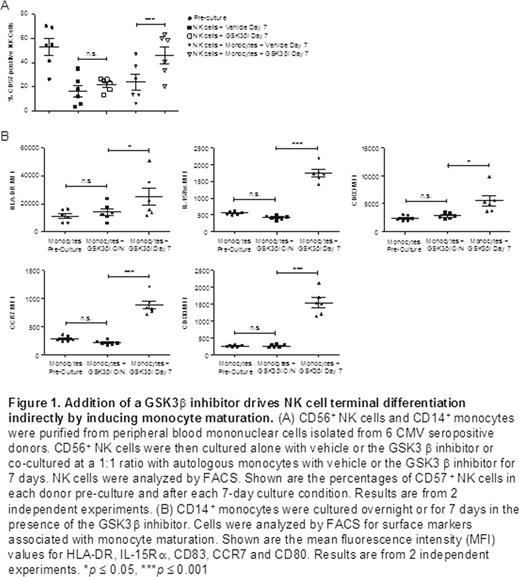Abstract
Natural killer (NK) cells are innate lymphoid cells that mediate immune responses against pathogens and cancer. Human NK cells are distinguished by the surface phenotype CD3-CD56+ and differential expression of the CD56 surface antigen defines subsets. CD56bright NK cells are presumed to be precursors of CD56dim NK cells, and terminal maturation of CD56dim NK cells is associated with acquisition of CD57. Rather than being an immunosenescence marker CD57 acquisition represents a shift toward greater effector function, including increased CD16 signaling (Fc receptor responsible for triggering antibody-dependent cellular cytotoxicity), enhanced cytotoxicity and decreased responsiveness to interleukin (IL)-12 and IL-18 stimulation. Cytomegalovirus (CMV) infection is uniquely associated with expansion of CD57+ NK cells expressing the activating receptor NKG2C.We have reported that in vivo expanded of CD57+NKG2C+ NK cells (referred to as adaptive NK cells) persist for over one year and are directly associated with reduced leukemia relapse after reduced intensity hematopoietic cell transplantation. Ex vivo expansion to enrich the subset of cells with the adaptive NK cell phenotype represents a new strategy to obtain high numbers of NK cells with enhanced effector function for use in adoptive transfer to treat cancer patients. The main challenge in enriching for CD57+ NK cells using current ex vivo expansion protocols is that IL-15, the cytokine that drives NK cell proliferation and is critical for NK cell survival preferentially expands less mature NK subsets that fail to terminally differentiate in culture. Our group has developed a novel NK cell expansion method that overcomes this barrier. Peripheral blood mononuclear cells from CMV seropositive donors are depleted of CD3+ T cells and CD19+ B cells and cultured for 7-9 days with IL-15 and a small molecule inhibitor of glycogen synthase kinase 3-beta (GSK3β), a multifunctional kinase downstream of the PI(3)K pathway. Compared to vehicle control, addition of the GSK3β inhibitor led to a substantial increase (2.2-fold ± 0.19, n=23, p<0.0001) in the CD57+ NK cell population. NK cells were highly enriched (90.9% ± 2.2) relative to the pre-cultured population post CD3/CD19 depletion (23.3% ± 2.5) (p<0.0001) Sorting experiments where purified NK cell subsets were cultured with monocytes obtained from the same donor and either vehicle or GSK3β inhibitor clearly demonstrated that the GSK3β inhibitor enhanced NK cell maturation. Importantly, NK cells expanded in the presence of the GSK3β inhibitor exhibited enhanced interferon (IFN)-γ production relative to the vehicle control in response to leukemia cells in vitro (2.15-fold ± 0.60, n=7, p=0.0002)and were superior in their ability to control tumor growth out to at least one month in a xenogeneic adoptive transfer model. To determine whether inhibition of GSK3β acted directly or indirectly on NK cells to drive terminal differentiation, purified CD56+ NK cells were cultured with or without monocytes in the presence or absence of the GSK3β inhibitor.The presence of differentiated monocytes was required for effective terminal NK cell differentiation, suggesting a monocyte-dependent, indirect effect of GSK3β (Figure 1A). Monocytes cultured with the GSK3β inhibitor exhibited markedly higher surface expression of an array of markers associated with monocyte maturation including HLA-DR, IL-15Rα, CD80, CD83 and CCR7 (Figure 1B). Thus, our data demonstrate that efficient NK cell differentiation is dependent upon the maturation state of the co-cultured monocytes.We have scaled our process to manufacture a GMP product (referred to as FATE-NK100) for clinical use. Using a representative apheresis product from a CMV seropositive donor containing 19.8 x 108 CD57+ NK cells and 1.7 x 108 CD57+NKG2C+ adaptive NK cells, we achieved 6.4-fold NK cell expansion resulting in a final GMP-grade product containing 142.2 x 108 CD57+ NK cells and 15.8 x 108 CD57+NKG2C+ adaptive NK cells.The cytotoxicity of activity of these ex vivo expanded adaptive NK cells in response to tumor targets is superior that of CD3/CD19-depleted haploidentical NK cells activated overnight with either IL-2 or IL-15 in the NK products in current clinical trials.These data have been presented to the FDA in preparation for a clinical trial of FATE-NK100 in lymphodepleted patients with advanced AML anticipated for Q1 2017.
Cichocki:Fate Therapeutics, Inc: Research Funding. Valamehr:Fate Therapeutics, Inc: Employment. Cooley:Fate Therapeutics: Research Funding. Bjordahl:Fate Therapeutics, Inc: Employment. Rezner:Fate Therapeutics, Inc: Employment, Equity Ownership. Rogers:Fate Therapeutics, Inc: Employment. Green:Fate Therapeutics, Inc: Employment. McKenna:Fate Therapeutics, Inc: Research Funding. Shoemaker:Fate Therapeutics: Employment, Equity Ownership. Wolchko:Fate Therapeutics: Employment. Miller:Fate Therapeutics: Consultancy, Research Funding; Oxis Biotech: Consultancy, Other: SAB.
Author notes
Asterisk with author names denotes non-ASH members.


This feature is available to Subscribers Only
Sign In or Create an Account Close Modal